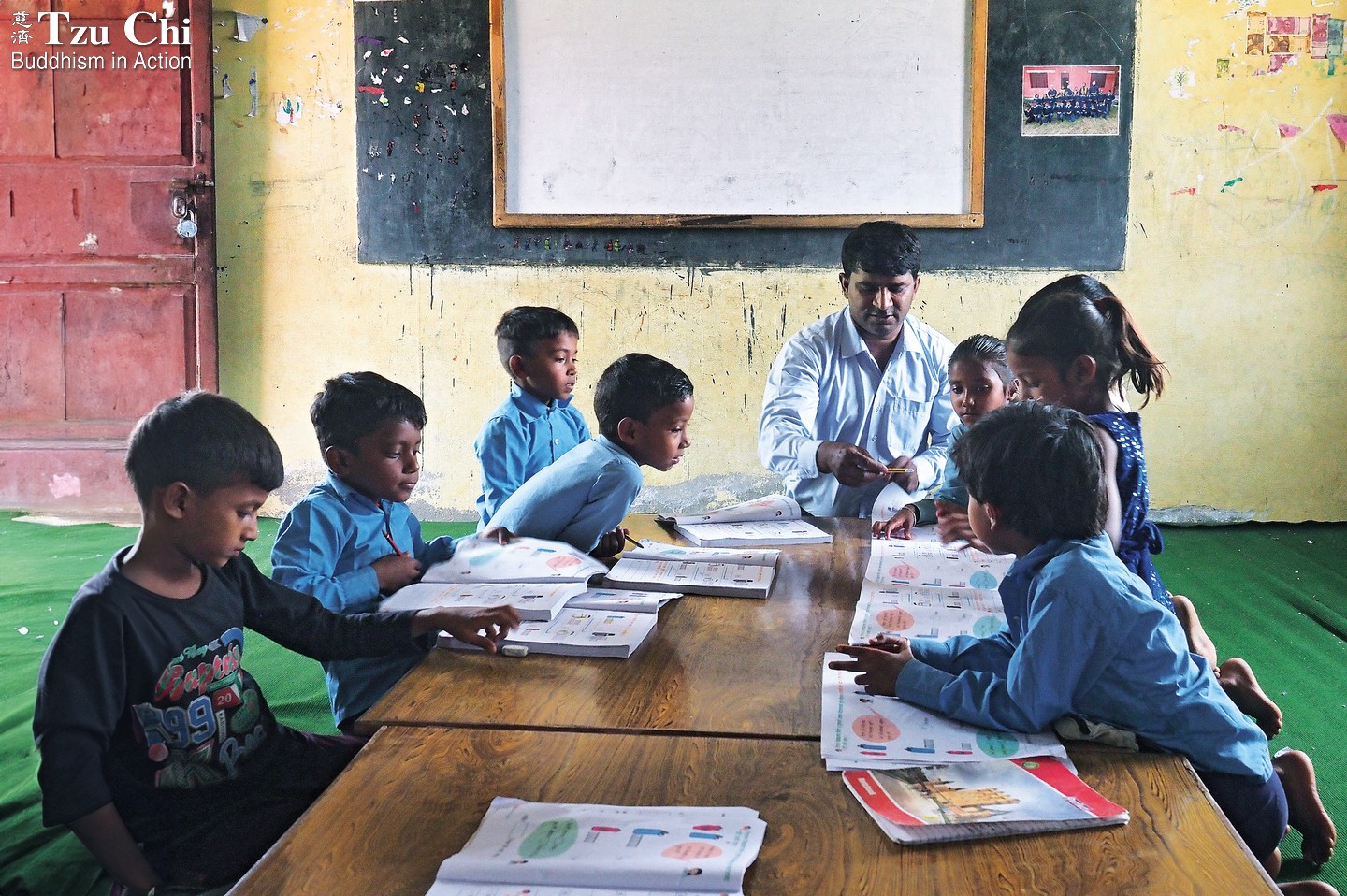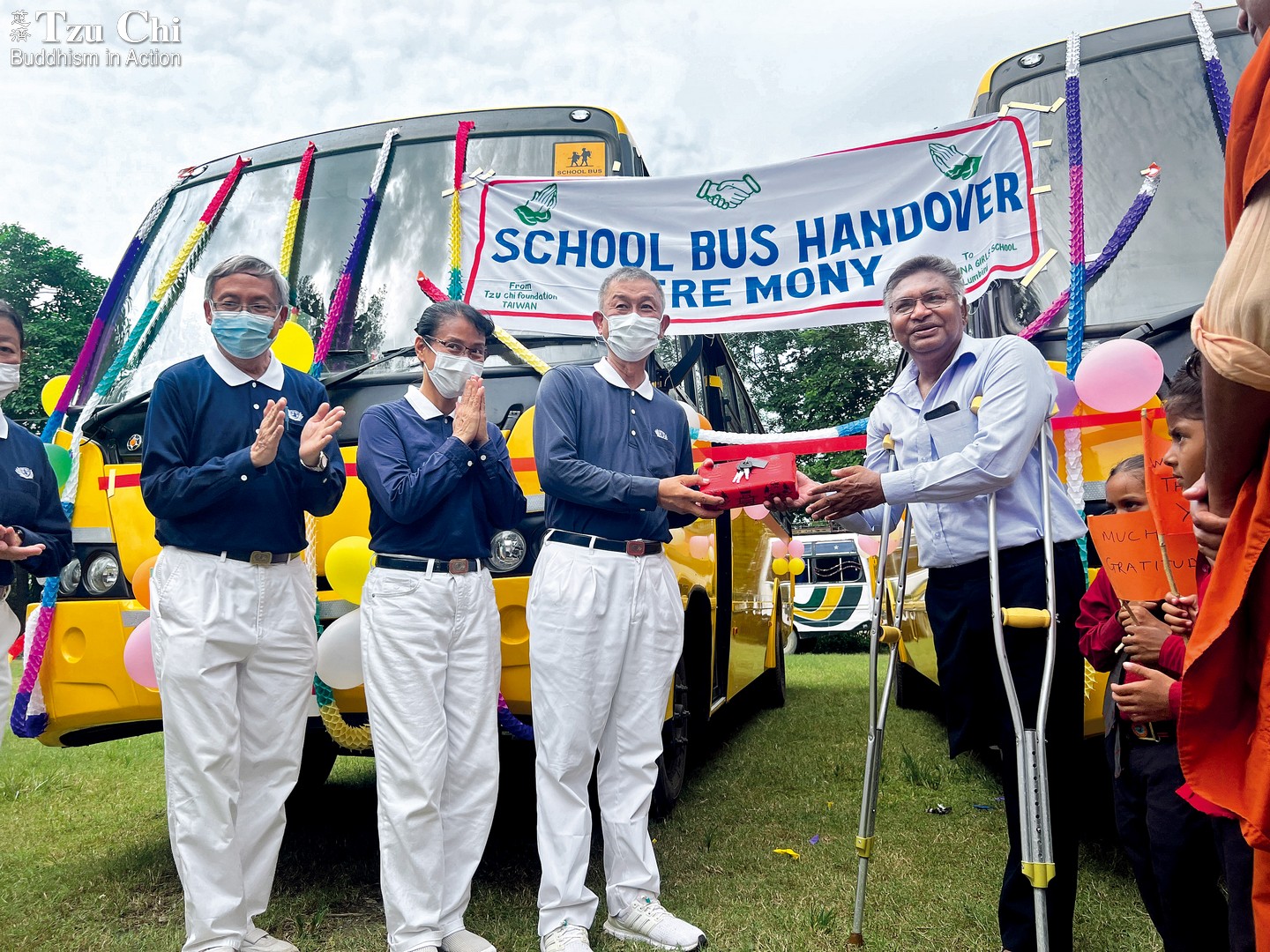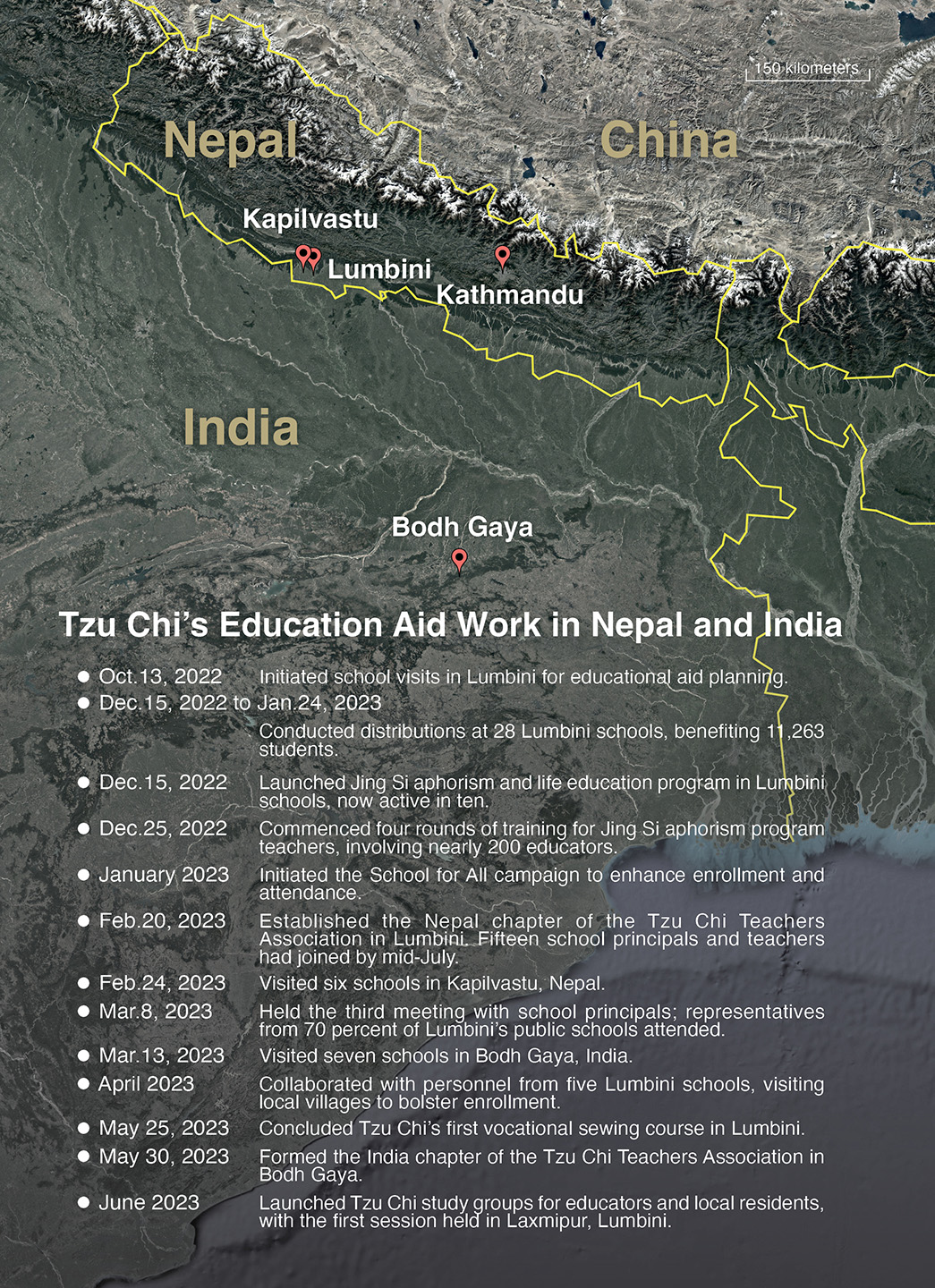By Lee Lay Sim, Leong Yit Yu, Goh Lam Kia, and Wu Xiu-ling
Translated by Wu Hsiao-ting
Despite Nepal’s offer of a decade of free education for its children, only 60 percent finish tenth grade. This is due mainly to poverty and traditional gender bias. In response, Tzu Chi volunteers are collaborating with Lumbini’s public schools to promote school attendance.

Principal Altaf Husen Khan teaches at Siddhartha Primary School in Lumbini, Nepal. Student attendance at local public schools fluctuates greatly during busy farming seasons.
Hong De Qian
It wasn’t yet noon, but the temperature in Lumbini, Nepal, had already climbed to 38 degrees Celsius (100.4°F). Despite the strong sun and a hot wind blowing sand, a group of people forged ahead along a rural path devoid of shelter, their footsteps unwavering.
It was April 2023. Madan Poudel, the vice principal of Shree Tarkulha Basic Level School in Lumbini’s Fifth Ward, was leading a team of teachers and Tzu Chi volunteers on a visit to the local village. With his infectious enthusiasm and approachable demeanor, he called out to the villagers when they arrived, urging them to step outside their homes. His voice resonated so well that a megaphone was unnecessary.
“This is how we can attract the children and inspire their attendance,” the vice principal declared.
Arriving at a small grocery store, Poudel stepped inside and purchased some candies. He then offered each child he encountered in the village a candy, saying, “Here’s a treat for you. Once school begins, make sure to join us in class. If you miss out, I’ll come looking for you, and then you’ll have to give me back two candies!” This amusing strategy for motivating students to attend school brought smiles to everyone around.
Meanwhile, the teachers from the group posted enrollment flyers in the village. They reminded villagers of the impending start of school and urged them not to forget to send their children back to school.
A five-year-old boy named Mukess Pasi, whose father works in Malaysia, stood by his mother’s side and hesitantly uttered, “I don’t have a birth certificate.” (A birth certificate is required to register for enrollment.) He longed to attend school, yet regrettably, his parents were unaware of his aspiration. Poudel gently touched the boy’s head and said to his mother, “If you’re willing to let your son go to school, we will help him register by asking the local leader to help with the application for his birth certificate.”
The amiable vice principal had a great time interacting with the village children. “Are you familiar with them?” he asked a group of children, gesturing towards the Tzu Chi volunteers dressed in blue shirts and white pants. The children responded in their innocent voices, “They all live here. We recognize them!” The atmosphere was lively and heartwarming; even the grocery store owner, touched by the dedication everyone displayed toward children’s education, offered biscuits as a treat.
Prior to the start of a new semester in April, Tzu Chi volunteers collaborated with principals and teachers in Lumbini to visit villages and promote student enrollment. Their goal was to ensure that children of eligible age did not miss out on educational opportunities.
Photo 1 by Yong Mun Fei; Photo 2 by Rajkumar
Working to improve attendance rates
Nepal provides ten years of free education for its population, which includes primary schooling for Grades 1 to 5, lower secondary education for Grades 6 to 8, and secondary education for Grades 9 and 10. After successfully completing the Secondary Education Examination, students have the opportunity to pursue higher secondary education, in Grades 11 to 12. Access to university-level education becomes available after the 12th grade.
Despite the availability of a free education, ensuring that children actually enroll and attend school remains a persistent challenge. A 2021 government economic survey revealed that only about 60 percent of students complete Grade 10; less than 30 percent successfully complete Grade 12.
Rural children have a lower enrollment rate, mainly due to poverty. Parents often require their children to contribute to the household income from an early age, so many children stop going to school in order to work. Limited parental education leads to a lack of awareness about the importance of education, causing parents to steer their children toward careers like farming, labor, or overseas manual work. Additionally, traditional gender bias often favors sons for educational opportunities, while daughters are expected to stay home to assist with household chores and prepare for marriage.
The poverty of the schools themselves, lacking basic infrastructure and facing substandard learning environments, further contributes to low enrollment rates. The Lumbini Cultural Municipality, with a population of over 88,000, illustrates this reality. The entire municipality has 32 public schools, of which just four offer classes up to Grade 12 and only nine offer classes up to Grade 10. Some schools have over 70 children crowded into a single classroom due to insufficient classrooms or teaching staff.
“The local middle and high schools aren’t independent entities; they follow a progression from the first grade. Therefore, if the school you’re enrolled in only goes up to the eighth grade and you wish to pursue further education, you need to seek schools offering higher grades in other towns,” explained Goh Lam Kia (吳南凱), a Tzu Chi volunteer from Singapore stationed on a long-term basis in Nepal.
Running schools in Lumbini is no easy task. Even if schools are public, staff must venture into villages to recruit students, try to motivate them to attend classes, and highlight the value of education to parents. In April 2023, shortly before the start of a new semester, school principals and teachers in Lumbini tirelessly visited villages, even extending their efforts to neighboring ones, in a bid to boost enrollment and attendance rates. Tzu Chi volunteers, actively promoting the School for All initiative in the region, collaborated with school personnel for home visits and enrollment drives, united in their mission to reintegrate children into the school environment.
During one instance, volunteers joined forces with personnel from Ram Janaki School in Lumbini’s Fourth Ward for a visit. Among the volunteers was Altaf Husen Khan, the principal of Siddhartha Primary School. The Manaora village in the Fourth Ward is predominantly Muslim, so Principal Khan’s Muslim background proved instrumental in the enrollment drive in the village. With his encouragement, many residents presented their children’s birth certificates to enroll them in Ram Janaki School.
Volunteers also teamed up with staff from Buddha Adarsha Secondary School to visit local villages. Hari Mohan, the school’s vice principal, stressed the importance of personally visiting students’ homes to truly understand their challenges. He hoped that people or organizations from outside Nepal hoping to support local education would also gain a clear understanding of the challenges faced by local children. This understanding would then enable them to contribute more effectively to enhancing educational resources in the region.
Shivshankar Yadav, 25, finished 12th grade at Buddha Adarsha Secondary School in 2019 but didn’t pursue further education. Although he aspired to study engineering at a university, financial constraints compelled him to halt his education and take up farming.
Phulkumari, 18, had no choice but to forgo continued schooling after finishing ninth grade in part because her family needed her help at home. The disappointment of not being able to continue her education weighed heavily on her, causing her to cry for several days.
Tzu Chi volunteers asked her while visiting her home, “Would you like to continue your studies?” She immediately nodded in agreement. Her mother, who stood beside her, spoke up to intervene, bringing up plans for her marriage. Nevertheless, Phulkumari stood her ground, stating firmly, “I want to study.” With Tzu Chi’s support, she was determined to seize this chance to pursue her education.

Tzu Chi donated two school buses in late September 2022 to Karuna Girls College in Lumbini. The donation was prompted by the challenges some students faced in continuing their studies due to the significant distances they had to travel. The donation serves as an example of the foundation’s educational support efforts in Lumbini.
Tulsi Narayan Matang

Sparking transformation
“In Nepal, only one out of every three students completes the 12th grade, which is a very low ratio. We deeply sympathize and really want to help,” said Malaysian Tzu Chi volunteer Sio Kee Hong (蘇祈逢) during a meeting with principals and teachers from over 20 schools in Lumbini on March 8, 2023. He expressed Tzu Chi’s desire to bring each and every student forced to discontinue their education back to school as part of the foundation’s School for All campaign. “If there are families where poverty or illness has prevented children from attending school, please provide us with a list. Tzu Chi stands ready to provide assistance, including providing subsidies or transportation, to help them overcome educational difficulties.”
Tzu Chi volunteers from Malaysia and Singapore have been stationed in Lumbini since April 2022 to help the foundation carry out philanthropic work there. In addition to offering assistance in other areas, they provide subsidies to help students continue their education, distribute school supplies, improve the nutrition of school meals, and assist students with transportation to schools. One of their key initiatives is the School for All campaign. Sio Kee Hong explained that since the campaign’s launch, 23 schools in Lumbini, accounting for 70 percent of the local public schools, have joined.
Additionally, Tzu Chi has funded equipment for multiple schools, including water pumps, to tackle issues related to drinking water safety and water supply. Volunteers are also promoting hygiene education, such as proper handwashing practices. Sio emphasized, “While material provisions offer a temporary solution, nurturing humanistic values requires sustained dedication.” Volunteers have partnered with ten schools as of July this year, conducting weekly visits to the schools to share Dharma Master Cheng Yen’s Jing Si aphorisms and promote life education.
Expanding on the experience garnered in Lumbini, the birthplace of the Buddha, volunteers extended their efforts in February this year to Bodh Gaya, India. (Bodh Gaya is another significant location in the Enlightened One’s life journey.) Sio Kee Hong explained, “Many local children have unfortunately resorted to begging and living on the streets due to their status as Dalits [formerly known as untouchables]. They face even greater hardships than children in Nepal.” Volunteers have been stationed in Bodh Gaya since mid-March, offering care in the Dalit villages of Bakraur and Silaunja. They have administered both charitable and educational aid in these underserved communities.
Education broadens horizons, prompts shifts in thinking, and has the potential to improve a family’s financial situation. Despite language barriers, climate challenges, and the cultural differences they encounter in Nepal, Tzu Chi volunteers unwaveringly adhere to Master Cheng Yen’s guidance to serve the underprivileged. Unfazed by difficulties, they are determined to embrace every opportunity to bring about meaningful change. The positive transformations they’ve seen in partner schools bring encouragement to the volunteers. Sio added, “Regardless of how dry a land may be, with the nourishment of rainwater and the Buddha’s teachings, we can witness the birth of hope.”
A young girl studies after school hours. Children in Lumbini often confront various challenges in their pursuit of education. They have to juggle agricultural and household duties while grappling with transportation difficulties in getting to school. Tzu Chi volunteers are dedicated to improving these circumstances and enhancing local children’s educational prospects.
Photo 1 by Yong Mun Fei; Photo 2 by Lee Lay Sim



